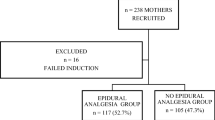Abstract
Objective
Aim of study was to determine effect of epidural analgesia on progress of labour and mode of delivery, to find out its complications in labour and puerperium and to evaluate neonatal outcome in terms of APGAR score.
Method
The present study was conducted in Department of Obstetrics and Gynaecology at Government Medical College Aurangabad over period of 2 years from June 2014 to June 2016 after taking approval from institutional ethical board. Hundred low-risk primigravidas were included in the study, 50 women received epidural analgesia for relief of labour pain at 3–4 cm and 50 women served as control. The important outcome FACTORS studied were the following : (1) duration of active phase of I stage, and II stage, (2) mode of delivery, (3) APGAR scores, (4) untoward reactions and intrapartum complications, (5) overall satisfaction of the mother.
Results
The operative delivery rates were not significantly different in both the groups (8% in the control group and 6% in the study group: p value NS, i.e. > 0.05). The duration of first stage (our study showed no significant difference in the duration of first stage in both the study and control groups p value > 0.05) and second stage of labour (p value NS > 0.05) and the need for oxytocin were comparable in the two groups. The side effects observed were minimal. It has given excellent pain relief and improved neonatal outcome (5 min). EA is associated with rates of vaginal delivery (88 v/s 84%) and LSCS rate (8 v/s 6%) which are comparable with control group.
Conclusion
Epidural analgesia is a very promising, safe and effective method of pain relief. No major complications and a good APGAR score make it a good option of care in modern obstetrics.
Similar content being viewed by others
References
Snow J. On the administration of chloroform during parturition. Assoc Med J. 1853;1(23):500.
Boudou M, Teissedre F, Walburg V, Chabrol H. Association between the intensity of childbirth pain and the intensity of postpartum blues. L’Encephale. 2007;33(5):805–10.
Desai P, Sinha A, Gandhi S, Prajapati M. Epidural analgesia for pain relief in labour in subjects with haemoglobin between 6–4gm/dl: a prospective study. J Obstet Gynecol India. 2008;58(2):131–3.
Bandyopadhyay KH, Afzal M, Mishra AK, Paul A. Labor epidural analgesia: past, present and future. Indian J Pain. 2014;28(2):71.
Anim-Somuah M, Smyth RM, Jones L. Epidural versus non-epidural or no analgesia in labour. Cochrane Database Syst Rev. 2011;1:12.
Abrão KC, Francisco RP, Cicarelli DD, Zugaib M. Elevation of uterine basaltone and fetal heart rate abnormalities after labor analgesia: a randomized controlled trial. Obstet Gynecol. 2009;113(6):1374–5.
Sengar S, Ohary R. Observation on effects of lumbar epidural analgesia for painless labour. Int J Sci Stud. 2016;3(12):244–7.
Halpern SH, Walsh V. Epidural ropivacaine versus bupivacaine for labor: a meta-analysis. Anesth Analg. 2003;96(5):1473–9.
Papalkar J, Shrivastava D, Labour EA. International journal of biological and medical research. Int J Biol Med Res. 2013;4(1):2707–12.
Paddalwar S, Nagrale M, Chandak A, Shrivastava D, Papalkar J. A randomized, double-blind, controlled study comparing Bupivacaine 0.125% and Ropivacaine 0.125%, both with Fentanyl 2 μg/ml, for labor epidural analgesia. Indian J Pain. 2013;27(3):147.
Agrawal D, Makhija B, Arora M, Haritwal A, Gurha P. The effect of epidural analgesia on labour, mode of delivery and neonatal outcome in nullipara of India, 2011–2014. J Clin Diagn Res JCDR. 2014;8(10):OC03.
Hincz P, Podciechowskil L, Grzesiak M, Horzelski W, Wilczyflski J. Epidural analgesia during labor: a retrospective cohort study on its effects on labour, delivery and neonatal outcome. Ginekol Pol. 2014;85(12):923–8.
Anwar S, Anwar MW, Ayaz A, Danish N, Ahmad S. Effect of epidural analgesia on labor and its outcomes. J Ayub Med Coll Abbottabad. 2015;27(1):146–50.
Labor S, Maguire S. The pain of labour. Rev Pain. 2008;2(2):15.
Pandya ST. Labour analgesia: recent advances. Indian J Anaesth. 2010;54(5):400.
Desai P, Patel P, Gupta A, et al. Epidural analgesia in labor. J Obstet Gynaecol India. 2006;56(5):417–22.
Author information
Authors and Affiliations
Corresponding author
Ethics declarations
Conflict of interests
The authors declare that they have no conflict of interest.
Ethical Standards
The authors state that approval for the study protocol was taken from the ethical comitee of Government Medical College, Aurangabad. No regulations or policies of the journal are violated.
Additional information
Dr. Varsha Laxmikant Deshmukh MD (OBGY) FICOG FMAS Professor in the Department of OBGY and Government Cancer Hospital, GMC, Aurangabad, India; Dr. Shaswatee Ghosh CHIEF RESIDENT in the Department of OBGY, Government Medical College Aurangabad, India; Dr. Kanan A. Yelikar (MD) (OBGY) Professor in the Department of OBGY, GMC, Aurangabad, India; Dr. Shreeniwas Gadappa MD (OBGY) Professor and HOD in the Department of OBGY, GMC, Aurangabad, India.
Rights and permissions
About this article
Cite this article
Deshmukh, V.L., Ghosh, S.S., Yelikar, K.A. et al. Effects of Epidural Labour Analgesia in Mother and Foetus. J Obstet Gynecol India 68, 111–116 (2018). https://doi.org/10.1007/s13224-017-1063-7
Received:
Accepted:
Published:
Issue Date:
DOI: https://doi.org/10.1007/s13224-017-1063-7



